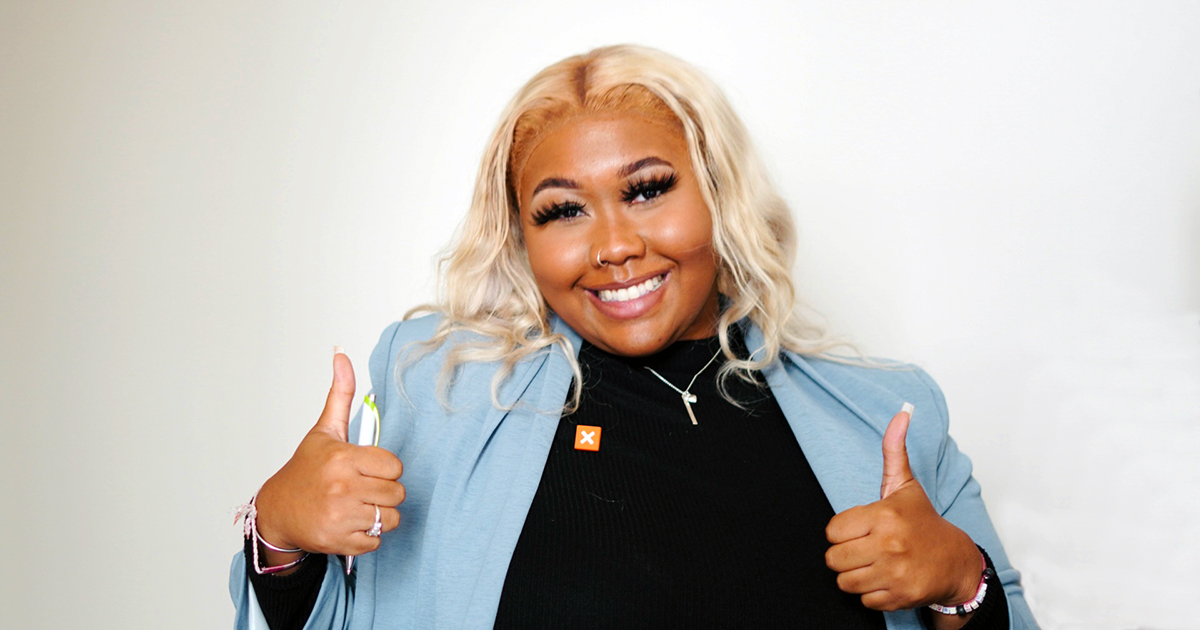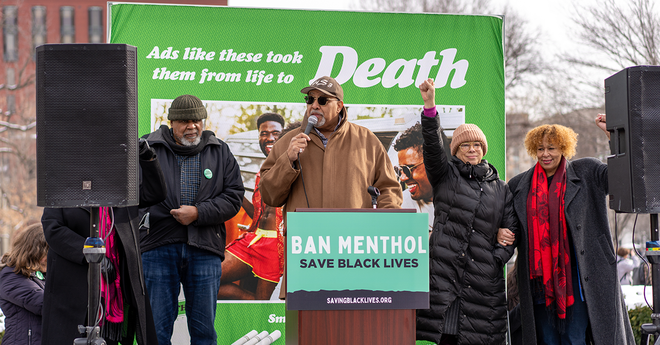Q&A: Learning the truth about menthol’s impact on African Americans
As one of the activists in her generation raising awareness about the enormous harm menthol cigarettes and other flavored tobacco products are causing to the African American community, Courtney Butler is learning from leaders who have been in the fight for decades, educating decision makers on Capitol Hill, and advocating for a tobacco-free policy on her campus. Butler, a truth College Leader at Trinity Washington University in Washington, D.C., is, in her words, saying “no thank you” to the tobacco industry.

Last September, she was among 35 young activists who gathered in Washington, D.C., for the Youth Menthol Convening organized by Truth Initiative. The activists met with nine congressional offices to discuss federal agency policies to end flavored tobacco sales and participated in the 3rd National Menthol Conference co-hosted by Truth Initiative and other public health groups, including the African American Tobacco Control Leadership Council.
The tobacco industry has strategically and aggressively targeted African Americans with menthol cigarettes for decades, including placing more advertising in predominantly Black neighborhoods and in publications that are popular with Black audiences. Today, nearly 9 in 10 Black smokers use menthol cigarettes. Black smokers have a harder time quitting smoking and die at higher rates from tobacco-related diseases such as cancer, heart disease, and stroke. In April 2022, the Food and Drug Administration stated that its proposed rules to remove menthol cigarettes and flavored cigars from the market could prevent 92,000 to 283,000 smoking attributable deaths among African Americans over 40 years.
In honor of Black History Month, Truth Initiative spoke with Butler about her experience attending the Youth Menthol Convening and National Menthol Conference, her work at Trinity Washington University to implement a tobacco-free campus policy, and her passion to reduce tobacco use among her community. Trinity Washington University is a grantee of the Truth Initiative Tobacco/Vape-Free College Program which has helped 148 schools adopt tobacco- and vape-free policies.
This interview has been lightly edited for clarity.
Q: What was your favorite part of the Youth Menthol Convening and National Menthol Conference?
A: The panel discussion we had with Dr. [Phillip] Gardiner (founding member and co-chair of the African American Tobacco Control Leadership Council). He was playing zero games. He was like, “I’ve been doing this since I was 18 and I’m still doing it and you see I’m not done, so long story short the work is never done.” I was like, “Dang, I got a lot of years left.” I took away from the convening that it’s 100 percent true that Big Tobacco is targeting African American communities, there’s no getting around it. And what I really like is because we have a concentration of African Americans in this region, there were so many of us at the conference and it’s really nice to see us fighting for each other because we’re the ones targeted. So I take pride in that, in being around people who look like me and care about the same things I do and, even if you’re 60 or 70 years old, you’re still willing to be out there on the frontlines speaking to youth, talking, giving presentations. It’s very inspiring.
Also, we went to Capitol Hill. That was something I had never thought I would be able to do. To me, activism was standing on the corner with a sign and some merchandise and saying, “Hey, this is our cause, come support, come out.” That was my little idea of activism. But now it’s “You can go talk to decision makers.” It was exciting to know that there’s more to it, even if we may be young – that it’s about everybody, especially black and brown communities.
Q: What made you passionate about the issue of menthol and flavored tobacco?
A: I heard of truth a long, long time ago with those commercials. I feel like everyone has seen those commercials. That was my first foot in the door. But I didn’t get the opportunity to be a campus leader until one of my professors brought it to me that Trinity had gotten the grant and wanted me to be a part of it, and I was like, “Yeah, let’s do it, why not?” When we had a screening of the documentary “Black Lives / Black Lungs” at Trinity, that was my first public speaking event. We had a presentation and a panel discussion and we had a walkthrough exhibit called “Menthol by the Decades.” And that got everyone’s attention because it was posterboards, pictures, documents, excerpts from the Master Settlement Agreement. Because even students who might not necessarily smoke cigarettes or vape, they know someone who does and they can carry that information like I carry it with me. I have a little fact book that’s like, “This is what cigarettes are, this is what menthol is.” Now every time I see a Black person smoking a cigarette, I’m like, “You know what kind of chemicals they put in there? How much did you pay for that carton? Did you know …?”
Q: What future initiatives and events around this issue do you have planned?
A: As campus leaders, we are doing at least one event a month. This month is “Love Your Lungs” for Valentine’s Day. Cessation tips, yoga, and guided deep breathing to teach others how to cope when they’re feeling overwhelmed or anxious. Take a deep breath, stretch, read, take a second. Also, we’re giving out little heart-shaped cutouts with truth facts on them. And we’re going to have tea and lollipops. Just a little something for the students. That’s the type of activism you would see on our campus.
But me, because I like to march, I don’t know how and I don’t know when, I’m going to try to organize a march. I want it to be more than Trinity, honestly, but I don’t know how many colleges that are close enough to come down to D.C. to march with us, but I’m going to check in to that because I really want to do a march. We can get a banner, full-blown “NO TOBACCO, NO SMOKING,” the new generation saying, “We say no thank you.” We can walk it all the way to the Capitol if we want to. That’s what I’m thinking on a grander community scale. And also, by the end of this semester, our goal is to implement the 100 percent tobacco and vape-free policy on campus and I’m pretty sure we’re going to get that, especially with all the events that we are doing. People know what we’re about and what we’re involved in, what our core goals and values are, and even though they come to have fun, to take a t-shirt or some socks or something, every time they leave, they leave with information.
More in traditional tobacco products
Want support quitting? Join EX Program
By clicking JOIN, you agree to the Terms, Text Message Terms and Privacy Policy.
Msg&Data rates may apply; msgs are automated.



